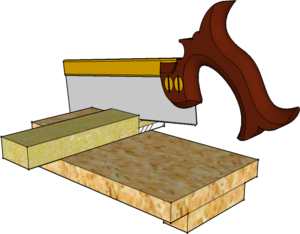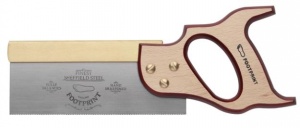Backsaw: Difference between revisions
From DT Online
Added Template |
No edit summary |
||
| Line 17: | Line 17: | ||
|- | |- | ||
| '''[[Dovetail Saw]]''' | | '''[[Dovetail Saw]]''' | ||
| - similar to a Tenon Saw but shorter at 150mm to 250mm with finer teeth at 14 to | | - similar to a Tenon Saw but shorter at 150mm to 250mm with finer teeth at ''(14 to 20 ''[[Teeth per Inch|TPI]]'')'' and used for finer work such as cutting '''[[Dovetail Joint|Dovetail Joints]]'''. | ||
|[[File:DovetailSaw.jpg|250px|link=http://www.amazon.co.uk/gp/product/B001V9KOE6/ref=as_li_tl?ie=UTF8&camp=1634&creative=6738&creativeASIN=B001V9KOE6&linkCode=as2&tag=dton06-21]] | |[[File:DovetailSaw.jpg|250px|link=http://www.amazon.co.uk/gp/product/B001V9KOE6/ref=as_li_tl?ie=UTF8&camp=1634&creative=6738&creativeASIN=B001V9KOE6&linkCode=as2&tag=dton06-21]] | ||
|- | |- | ||
| '''Gent's Saw''' | | '''Gent's Saw''' | ||
| - or '''Fancy Backsaw''' - typically 150mm long with very fine teeth ''(16 to 25 [[Teeth per Inch|TPI]])'' and used for very fine cutting of [http://en.wikipedia.org/wiki/Molding_%28decorative%29 '''mouldings'''] and [http://en.wikipedia.org/wiki/Inlay '''inlays'''] for example. | | - or '''Fancy Backsaw''' - typically 150mm to 200mm long with very fine teeth ''(16 to 25 [[Teeth per Inch|TPI]])'' and used for very fine cutting of [http://en.wikipedia.org/wiki/Molding_%28decorative%29 '''mouldings'''] and [http://en.wikipedia.org/wiki/Inlay '''inlays'''] for example. | ||
|[[File:FancyBackSaw.jpg|200px|link=http://www.amazon.co.uk/gp/product/B0168Y2BKS/ref=as_li_tl?ie=UTF8&camp=1634&creative=6738&creativeASIN=B0168Y2BKS&linkCode=as2&tag=dton06-21]] | |[[File:FancyBackSaw.jpg|200px|link=http://www.amazon.co.uk/gp/product/B0168Y2BKS/ref=as_li_tl?ie=UTF8&camp=1634&creative=6738&creativeASIN=B0168Y2BKS&linkCode=as2&tag=dton06-21]] | ||
|- | |- | ||
| '''Razor Saw''' | | '''Razor Saw''' | ||
| - commonly approximately 125mm long interchangeable blades with extremely fine razor sharp teeth ''(i.e | | - commonly approximately 125mm to 150mm long interchangeable blades with extremely fine razor sharp teeth ''(i.e 40 [[Teeth per Inch|TPI]] or more)'' and used for fine work in [http://en.wikipedia.org/wiki/Ochroma_pyramidale '''balsa'''] and plastics - e.g. modelling. | ||
|[[File:RazorSaw.jpg|200px|http://www.amazon.co.uk/gp/product/B00IEHYDIQ/ref=as_li_tl?ie=UTF8&camp=1634&creative=6738&creativeASIN=B00IEHYDIQ&linkCode=as2&tag=dton06-21]] | |[[File:RazorSaw.jpg|200px|http://www.amazon.co.uk/gp/product/B00IEHYDIQ/ref=as_li_tl?ie=UTF8&camp=1634&creative=6738&creativeASIN=B00IEHYDIQ&linkCode=as2&tag=dton06-21]] | ||
|} | |} | ||
Latest revision as of 09:37, 20 August 2016

Description
Backsaws have a stiffener along the top edge which helps to keep the blade straight and allows for closer control and fine work.
Features and Applications
| Tenon Saw | - the most common backsaw, typically 250mm or 300mm length with 10-14 teeth per inch (TPI) and used extensively for general woodworking and fine cutting of joints such as tenons. | 
|
| Dovetail Saw | - similar to a Tenon Saw but shorter at 150mm to 250mm with finer teeth at (14 to 20 TPI) and used for finer work such as cutting Dovetail Joints. | 
|
| Gent's Saw | - or Fancy Backsaw - typically 150mm to 200mm long with very fine teeth (16 to 25 TPI) and used for very fine cutting of mouldings and inlays for example. | 
|
| Razor Saw | - commonly approximately 125mm to 150mm long interchangeable blades with extremely fine razor sharp teeth (i.e 40 TPI or more) and used for fine work in balsa and plastics - e.g. modelling. |






